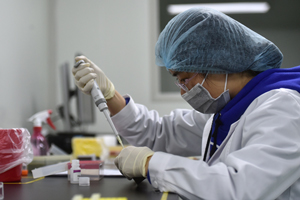Experts warn of potential concerns about genetic privacy
Tests manufactured by a US company called 23 and Me may help people make lifestyle choices or inform discussions with healthcare professionals about potential intervention, the statement said.
The illnesses include Parkinson's disease, late-onset Alzheimer's, celiac disease(an autoimmune disorder), hemophilia C and excessive absorption of iron,which may lead to organ damage.
Jennifer Ho, a physician at the Massachusetts General Hospital, is skeptical of the value of random testing.
"It only makes sense for an individual to be genetically screened if there are prior medical indications," she said.
Ho urged people to be screened at professional, officially regulated facilities to avoid illegal or accidental disclose of information: "We (people in the United States) worry a lot about privacy of personal genetic information. I'm concerned about what subsequently happens to the details obtained by testing companies."
In addition to unauthorized disclosure of private information, she identified a number of potential risks, such as accidental contamination or deliberate switching of samples.
"Would you want information about your genomic sequence to be available to the public or to insurance companies?" she said, adding that insurers may reject claims or potential customers whose tests indicate the risk of certain illnesses. "Governments must strictly regulate these practices to protect privacy and avoid potential discrimination."
Insurance concerns
Luo Yongzhang, a professor of biochemistry at Peking University, said the greater availability of genetic testing and genomic sequencing mean privacy and the threat of discrimination have become important issues in developed countries.
For example, insurance companies may refuse to provide cover for women with defective genes that increase the odds of developing breast cancer. "The general public is still not fully aware of the looming risk," he said.



















